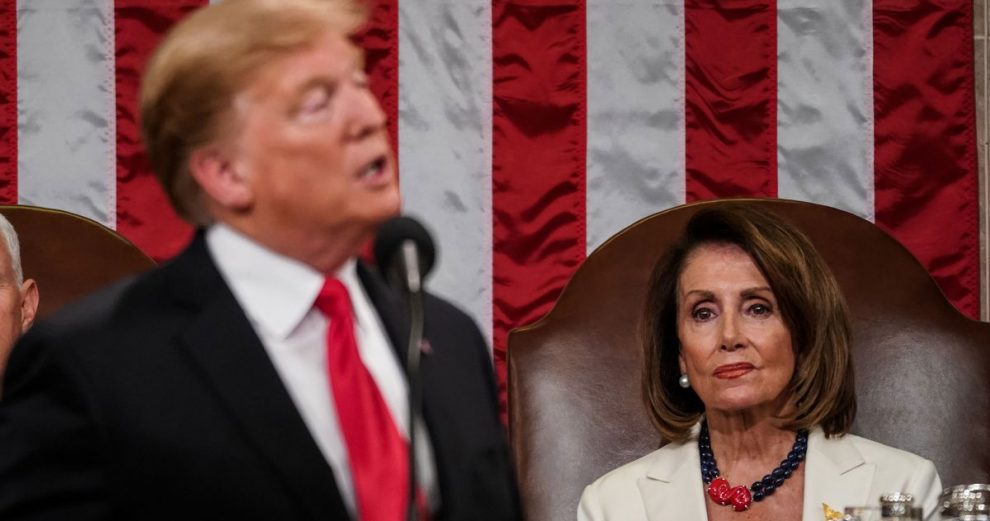Bungled negotiations over the next stimulus package and a resurgence of coronavirus infections are threatening the U.S. economic recovery, creating problems for President Trump as he charts the path forward for his reelection campaign.
The White House and Congress remain far from a deal negotiations over the next stimulus package, even as expanded unemployment benefits and a federal moratorium on evictions expire, though the two sides touted progress following an unusual weekend meeting.
The White House has sought to blame Democrats for the failure to reach a short-term deal to extend the employment benefits and pause evictions, but Republicans waited weeks to begin formal negotiations and have yet to come together on a package themselves.
Bungled negotiations over the next stimulus package and a resurgence of coronavirus infections are threatening the U.S. economic recovery, creating problems for President Trump as he charts the path forward for his reelection campaign.
The White House and Congress remain far from a deal negotiations over the next stimulus package, even as expanded unemployment benefits and a federal moratorium on evictions expire, though the two sides touted progress following an unusual weekend meeting.
The White House has sought to blame Democrats for the failure to reach a short-term deal to extend the employment benefits and pause evictions, but Republicans waited weeks to begin formal negotiations and have yet to come together on a package themselves.
“When people don’t have money, they can’t spend it, which reduces the demand for goods and services, and with that the jobs to provide those goods and services,” said Elise Gould, senior economist at the left-leaning Economic Policy Institute.
If Congress failed to restore the additional unemployment benefits altogether, she said, it would kill 5 million jobs over a year.
The Committee for a Responsible Federal Budget estimated that the expired unemployment benefits could lead disposable incomes to drop as much as 8.5 percent compared to July.
Republicans and Democrats are pointing fingers at one another over the expiration.
White House chief of staff Mark Meadows used a rare appearance in the White House briefing room Friday to chide Democrats for rejecting their offers to extend the expanded unemployment benefits and the pause on evictions, claiming they offered no counter proposals.
Democrats say that Republicans pushed the negotiations to and past the precipice by delaying negotiations until the last minute, even failing to come up with their own bill until Monday, after the evictions moratorium already expired.
House Speaker Nancy Pelosi (D-Calif.) rejected the idea of a short-term deal on unemployment benefits when asked to respond to criticism from Meadows on Friday, arguing that a one-week extension would only be useful if both sides were close to an agreement on a broader deal.
“We passed a bill over 10 weeks ago,” Pelosi told reporters. “Why don’t we just get the job done.”
Administration officials and Democrats markedly toned down their language following a meeting on Saturday, calling it a productive discussion but saying they remained far from an agreement no less.
“We’re not close yet, but it was a productive discussion. Now each side knows where they’re at,” Senate Minority Leader Charles Schumer (D-N.Y.) told reporters after the meeting.
If unemployment were extended at current rates for several months, Democrats figure, they would lose leverage for passing other key parts of their bill, which include rental assistance, a renewed and expanded moratorium on evictions, and aid to state and local government.
EPI’s Gould says the latter is crucial, as slashed state budgets lead to more unemployment. Already, 1.5 million people have lost state and local jobs, and more cuts are likely without aid.
Democrats also rejected the GOP proposal to reduce extra benefits to $200 until states can implement new systems that would pay people up to 66 percent of their wages.
Republicans argue that the outsize benefits create warped incentives, forcing people to take a pay cut to go back to work. They also worry about creating permanent bloat in the safety net that will last beyond the pandemic.
“This could just become an ongoing feature of the unemployment system,” said Matt Weidinger, an unemployment expert at the right-leaning American Enterprise Institute.
Despite the economic pain, Trump has continued to point to the economy in his bid for reelection, reflecting on its strength before the pandemic, touting the significant jobs gains in May and June and promising a swift recovery under his watch. Trump is trailing presumptive Democratic nominee Joe Biden in national and swing state polls, but surveys tend to show Trump is more trusted than Biden in handling the economy.
Speaking in Somerset, Pa., on Thursday, Vice President Pence argued that the Trump administration’s policies had laid the groundwork for a quick rebound while warning that Democrats would raise taxes and “bury our economy under an avalanche of regulation.”
White House advisers have repeatedly spoken of a “V-shaped” recovery and have been buoyed by the jobs reports showing record gains in jobs after steep losses in April.
White House economic adviser Larry Kudlow expressed optimism about the recovery this past week, pointing to data on the housing market and automobile sales and production. But he also conceded that there could be a “moderation” in the V-shaped recovery he has predicted because of the case surges in states like California, Texas and Florida.
“We are scouring the numbers to see how much moderation there is,” Kudlow told reporters Monday.
Others say that hope for a V-shaped recovery was overly optimistic and that the recent developments risk the economy sinking back into a recession without substantive action by Congress.
“The V part is over. That was May and June,” said Mark Zandi, chief economist at Moody’s Analytics. “Now, we’re flatlined. There is no V. Now the question is, is it going to be a W.”
Story cited here.
























